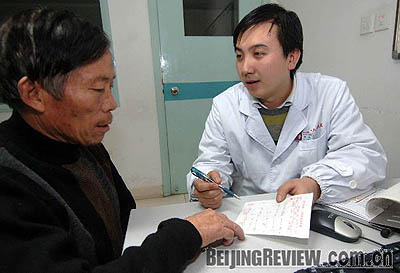|

"It would be the fulfillment of a Utopian dream if the whole of China, with its huge rural population, was given medical insurance coverage," a scholar once said.
However, Xu Yuxiu, who hails from northeast China's Heilongjiang Province and is a deputy to the 11th National People's Congress (NPC), maintains an optimistic attitude towards this.
"The day when the entire population of China is covered by medical insurance is not far, thanks to the establishment of the new rural cooperative medical scheme," she said, at a panel discussion of the new government work report.
Reading from his work report at the First Session of the ongoing 11th NPC, Chinese Premier Wen Jiabao said that the medical service reform aims to maintain the non-profit nature of public medical and healthcare services, and set up a basic medical and healthcare system, in an effort to provide safe, effective, convenient and affordable services.
"We must absolutely carry out the reform so as to provide everyone access to basic medical and health services," he said.
Xu, who is also Director of the Third Affiliated Hospital of Harbin Medical University, said that China had laid a solid material foundation for the establishment of a fair medical system, thanks to its financial accumulation since reform and opening up. With the weight of 30 years' experience in the medical field, she explained that as a country with a large population of farmers, the nation may not have set a high level of medical insurance, but was still able to provide the total population of China access to basic medical insurance.
A 2003 national survey of healthcare services showed that medicare coverage in urban and rural areas was fairly low, with the rate of self-pay for medical care standing at 70.3 percent, and various insurance tools covering only 29.7 percent. Public criticism of soaring medical fees and lack of access to medical care remain major problems.
Xu suggested that the government should increase its input in this regard and ensure the non-profit nature of public medical institutions.
"Apart from that, patients should change their tendency to go to big major hospitals and see expert doctors, whether they're seriously ill or not," she said.
Xu proposed a method to resolve the problem of inaccessible medical care: to develop community clinics, which would treat vast numbers of local patients suffering from ordinary illnesses. In this way, large hospitals would be able to make use of their high-quality medical resources to address cases of illness that were both hard to diagnose and to cure.
"Certainly, this approach needs additional funds from the state, to cultivate a great number of high-quality doctors for community clinics," she added.
China Central Television (CCTV), the state-level television station has begun to broadcast an advertisement to publicize community clinics. The ad shows this scene: an old couple afflicted with the common cold are waiting in a long queue inside a major hospital, while a father and a son, having seen a doctor and acquired medicines at a local clinic, are relaxed and on their way home.
An increasing number of farmers may not have to wait long for this Utopian ideal to be established. China established a rural cooperative medicare scheme in 2003, which went on to cover 2,448 counties and cities by the end of 2007. The scheme extended to 730 million farmers, accounting for 85.7 percent of the nation's total. The total expenditure on the scheme fund is 22 billion yuan ($3.1 billion), and it has benefited 260 million people so far.
The new rural cooperative medical scheme, which focuses on health insurance and covers major illnesses, will be fully implemented in rural areas this year, said Premier Wen. The government has decided to raise medical financing from 50 yuan ($7) to 100 yuan ($14) per person per year, with central and local governmental contributions to be raised from 40 yuan ($6) to 80 yuan ($11). By paying 20 yuan ($2.8) only each year, farmers will have access to basic medical insurance.
Wen also said that the government plans to earmark 83.2 billion yuan ($11.7 billion) this year to support medical service reform and development, with the focus on rural and grass-root areas.
It will not be long before China, with its GDP ranking fourth in the world, follows in the footsteps of countries that provide basic health coverage to each and every citizen. | 